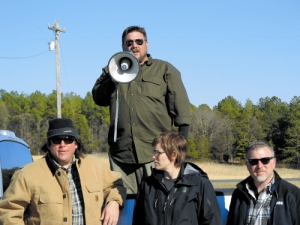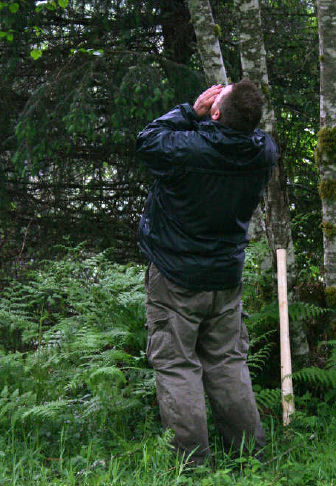
July 10, 2011
An Editorial: What Impact Will Finding Bigfoot Have?
by Loren Coleman

Today, Sunday, July 10th, is the finale of the first short season of Animal Planet’s Finding Bigfoot. The latest program merely continues with the pattern of the others, to wit:
Jul 10, 10:00 pm & 11:00 pm E/P
(60 minutes)
Finding Bigfoot
Alaska’s Bigfoot Island
A call from a concerned mayor brings Matt Moneymaker and his team of Bigfoot Research Organization experts to the island of Prince of Wales, Alaska. The island has a long history with the beast, but a recent spike in activity has the townspeople on edge.
It seems like a good time to take a longterm look at what influence and impact the Finding Bigfoot series may have on the future interactions of television and cryptozoology, especially as they relate to what educational role Finding Bigfoot is filling for youthful students of cryptozoology and hominology.
So, here are some initial thoughts on the series.
It is popular. This popularity means many people are watching it, and it will be taken as a reflection of what “cryptozoology” is.
Television, even reality television, is not a good mirror of the real world, and certainly not of cryptozoology. Matt Moneymaker’s personality is shown, but it is demonstrated in the extreme. The heavy editing of the series in post-production sensationalizes the search for Sasquatch. This has its pros and cons for the world of television. Certainly ratings are up. But it does not actually show what happens during most serious pursuits for cryptids in the field. More waiting, more questions that are not leading ones, and more scientific openmindedness occur.
The passion of the team is conveyed. That is a positive and real. It is hopeful that people who are brought into the show’s viewing audience will critically watch the program, come away with an interest in the topic, and do their own reading and research, if they wish to get involved.
The unfortunate reality, however, from dozens of people whom I have discussed the program with, is that it appears many people who like Bigfoot are watching this series as if it was a train wreck. They are tuning in to laugh at the antics of the team, feel better about themselves as they are using the show to figure out what they would not do, and just can’t believe some of the things they are hearing. But, guess what, they click it on again. At the Animal Planet end, the company doesn’t care why people are watching it.

Just as crowds gather to watch a burning building, people are returning, week after week, to tune in to Finding Bigfoot to watch the craziness. The quality of the program, the underlying “evidence” of Bigfoot demonstrated, may in actuality be very low, but that is not translating into low viewership. It is entertainment, pure and simple, and it has little or nothing to do with any high standards of cryptozoology that are taking place on the show.
People have told me they watch to see what is the newest outrageous thing or incident that Matt Moneymaker says or does. Do you think that the production team is going to edit these out in future episodes? Of course not. The meal ticket for this program now is the sensational, ego-driven nature of Moneymaker. Rumors that he was being kicked off the program or not being brought back for Season Two are just that, rumors. Matt is this program’s moneymaker. He is the reason it is the number one series currently on Animal Planet.
How will the reaction to this series translate across the media world? More cryptozoology-oriented programming, no doubt, with more human conflicts and comedy sub-themes will be approved for shooting. More explorations of the dark belly of Sasquatch searching will be proposed in movies and books.
Hopefully, a novel reaction and growth spurt will develop quickly. Soon insightful films and documentaries shall appear too, but only the most thoughtful of producers will clearly see that this is the next step in the evolution of this genre. They will not be boring documentaries, but exciting forms of programming that will capture the passion of the search, which in reality is the underlying strength of Finding Bigfoot.
The most negative thing about the series is how it is undermining good field techniques. Even children and young people watching this series have told me they feel they are not learning how to properly interview witnesses. Instead, they are seeing how theories and bias are getting in the way of relating to the people who are telling of their encounters. Clearly, Finding Bigfoot, while popular, is revealing vast gaps in possibilities in further programming, and someone is going to rush in to fill those voids. Entertaining and engaging series, without laughable human conflict, are waiting in the wings.
The success of Finding Bigfoot, therefore, will make this next dynamic leap in cryptozoology programming possible. And, at least, for that, we must thank Finding Bigfoot.

About Loren Coleman
Loren Coleman is one of the world’s leading cryptozoologists, some say “the” leading living cryptozoologist. Certainly, he is acknowledged as the current living American researcher and writer who has most popularized cryptozoology in the late 20th and early 21st centuries.
Starting his fieldwork and investigations in 1960, after traveling and trekking extensively in pursuit of cryptozoological mysteries, Coleman began writing to share his experiences in 1969. An honorary member of Ivan T. Sanderson’s Society for the Investigation of the Unexplained in the 1970s, Coleman has been bestowed with similar honorary memberships of the North Idaho College Cryptozoology Club in 1983, and in subsequent years, that of the British Columbia Scientific Cryptozoology Club, CryptoSafari International, and other international organizations. He was also a Life Member and Benefactor of the International Society of Cryptozoology (now-defunct).
Loren Coleman’s daily blog, as a member of the Cryptomundo Team, served as an ongoing avenue of communication for the ever-growing body of cryptozoo news from 2005 through 2013. He returned as an infrequent contributor beginning Halloween week of 2015.
Coleman is the founder in 2003, and current director of the International Cryptozoology Museum in Portland, Maine.
Filed under Bigfoot, Breaking News, Cryptomundo Exclusive, Cryptotourism, CryptoZoo News, Cryptozoologists, Cryptozoology, Eyewitness Accounts, Finding Bigfoot, Pop Culture, Sasquatch, Television